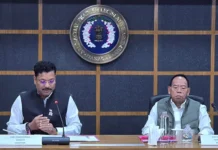[ Pisi Zauing ]
There are moments when a tragedy pierces so deep that it shakes an entire community’s faith in its institutions. The death of 12-year-old cadet Tadu Haro is one such moment. What should have been a story of discipline, courage, and youthful ambition at Sainik School, Niglok, has instead become a symbol of horror and betrayal.
On the morning of 1 November, the lifeless body of young Haro was found near the school’s overhead water tank. Only the night before, his laughter had echoed through the dormitory halls. Now, silence reigns there, a silence heavy with questions, guilt, and grief. Arunachal Pradesh has been left staring at a wound that refuses to heal.
Haro was in Class 7, bright and disciplined, with the kind heart of a boy who dreamt of wearing the olivegreen uniform one day. His humble parents had sent him to one of the state’s most reputed institutions, proud that their son had been chosen for a school meant to build the nation’s future leaders. They believed he was safe. They trusted the promise of discipline, structure, and honour. They never imagined that their trust would be repaid with tragedy.
Police have since detained senior cadets and arrested three staff members, including house masters and the hostel superintendent. But these arrests are only the beginning of uncovering what appears to be an institutional collapse, a failure so severe that it cost a boy his life.
How could this happen in a school that boasts of vigilance and discipline? How could a child be terrorised to the point of death without a single adult noticing the warning signs? Parents in Arunachal are now asking the same chilling question: if not in schools, where are our children truly safe?
Ragging has long been defended as a misguided tradition, a rite of passage. That phrase must now be buried with the same finality as the lives it has taken. Ragging is not mentorship. It is cruelty by another name. It is the abuse of authority and the stripping of dignity from those too young to fight back. For decades, such acts have been dismissed as harmless training in toughness, but toughness learned through suffering is not strength. It is trauma.
If the early reports prove true, then Haro’s death was not just the result of cruel students. It was the result of a system that breeds silence, fear, and complicity. Wardens who turned a blind eye.
Administrators who cared more for reputation than safety. A structure that prized obedience over empathy. This is where discipline turns into darkness, where the line between respect and fear disappears.
In sorrow and anger, the aftermath of this tragedy has united Arunachal. Candlelight vigils now burn outside the school gates and across towns. Hundreds and hundreds of citizens, students, and parents gather, holding photographs of a boy they may never have met but whose loss they all feel. Each candle flickers with the same message: justice must be swift, transparent, and absolute.
Haro’s death should not become another file in the slow machinery of bureaucracy. The government must establish a special fast-track court to ensure that those responsible, students and staff alike, including the school authority, face the consequences of their actions. There must be no hiding behind uniforms or institutional prestige. Accountability must reach every level of authority that failed to act.
But justice must go beyond punishment. This tragedy must trigger a transformation in how our schools function. Residential institutions across the state should have trained counselors, anonymous reporting channels, and regular emotional check-ins. Discipline should not mean fear; it should mean guidance. Leadership should not mean dominance; it should mean protection. Schools that boast of creating soldiers must first learn how to protect the children entrusted to them.
The order of the Education Department to strengthen anti-bullying mechanisms is welcome, but they must be enforced, monitored, and reviewed regularly. Teachers and wardens must receive training to identify distress. More importantly, students must be taught that respect is earned through kindness, not through intimidation.
The death of one child must awaken the conscience of an entire system. Tadu Haro’s name must not fade into a statistic or a forgotten headline. It should become a reminder, carved into every school wall: that no drill, no ritual, and no chain of command is ever worth a child’s life.
Haro was sent to become a soldier, not a statistic. His parents placed their dreams in the hands of an institution that promised to protect him. That promise was broken. Now, only justice can begin to mend it.
In every candle lit for Haro, there burns a demand, not just for accountability, but for change. Because if we let this die down, if we accept this as another tragedy, then it will happen again.
Discipline without dignity is not education – it is cruelty. And if our schools cannot guarantee a child’s safety, then the entire idea of education stands meaningless.
Justice for Tadu Haro is not an appeal. It is a moral imperative.


